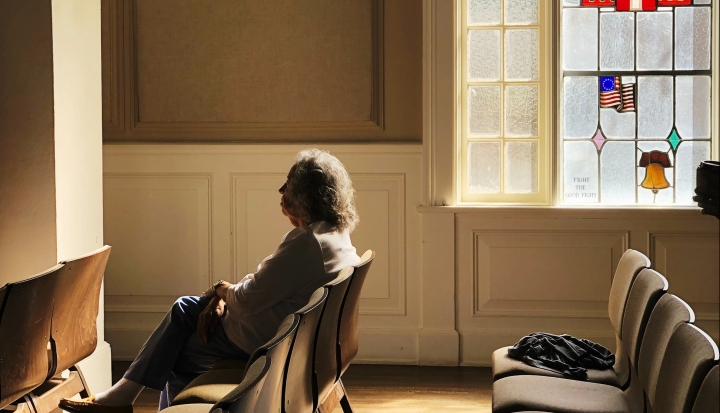Aileen Carlin Giannelli died on September 8.
By itself, that’s probably not something most readers are interested in. Statistically, perhaps as many as 46,000 American Catholics died in September, and I am sure any reader of these words can name at least one of them. But this particular American Catholic was my wife’s mother and my good friend.
Aileen was one of six children born to a Brooklyn schoolteacher and the son of a New York City police captain who, after a stint on the New York stage and declining an invitation to join the Mercury Theatre of Orson Welles and John Houseman, himself joined the NYPD, later working as a court attorney.
Coming from a family of cops, actors, lawyers, teachers, and proud Irish know-it-alls, Aileen made an unusual choice when she entered a Maryknoll convent after graduating high school. She eventually left the convent, once telling me that she felt like she might do more good as a layperson. But she remained close to Maryknoll spiritually and vocationally.
She did plenty. Aileen taught first in the Paterson, New Jersey public schools, then in a series of Catholic grammar and high schools before becoming a Catholic school principal in 1997. At 60, she earned a Ph.D. in church leadership from Fordham, and her final professional years were spent as an adjunct professor there in the Graduate School of Religious Education.
Along the way, she had a long, happy marriage, raised two children, adored four grandchildren, and her generosity sustained family, friends, neighborhood children, her parish, and a variety of outreach ministries. Serving others humbly until the last 17 days of her life, her rest now is well earned.
Like me, my wife was a teenager during the 1980s. One Sunday, after a few weeks of watching her mom come home from Mass a little exasperated with the direction the church had begun taking in those days, my wife asked an innocent question: “If the church upsets you so much, why do you keep going back?”
Aileen told her daughter, simply and without rancor, “It’s my church, too, and I’m not leaving.”
That conversation stayed with my wife. As the crisis in the church continues to unfold, I am thinking about it, too.
The pews were emptying even before the Pennsylvania grand jury report, the McCarrick revelations, and Archbishop Viganò’s testimony. We have been through Boston. We have seen consumerism and materialism eat into the church’s grip on Catholics’ imaginations. Polarization has taken a terrible toll.
Still, what we are living through now feels like something different. People I know and admire who have stuck with the church through everything seem now like they have reached a breaking point. The prevailing sentiment seems to be captured in the short sentence, “I’m Done.”
I am not one of those scolds telling people who are leaving that they are bad Catholics and the church is better off without them. I don’t believe that at all. As one who has studied the church, and especially as a parent, the anger and frustration are not mysterious to me. The church has missed a lot of opportunities to avoid these problems, and it is difficult now not to wonder if it all ever can be fixed.
That’s where I come back to Aileen.
An admirer of Fordham’s Elizabeth A. Johnson, Aileen understood the church as something we all do together. Our baptism calls each of us to be a friend of God and a prophet, and we all share the responsibility to build the city of God. That is what the church is. No matter how much damage the church’s leaders do, that responsibility doesn’t go away. Maybe some amount of Irish fatalism explains it, but no amount of bad news about the church seemed to shake that commitment in Aileen. If anything, bad times strengthened her resolve.
I think there is something else we should notice, too. A woman who chose to seek advanced training in church leadership in a church that does not always welcome women as leaders either was foolish or lived in hope for a different, better church.
I know Aileen wasn’t foolish. I am so certain because I believe in the church she and many other laypeople have believed in. It is one where “the laity share in their own way in the mission of the Church,” “perform the mission of Christ and the Church,” and make “the Church present and active in the midst of temporal affairs.” It seems to me that the church that must emerge from this difficult time if we can keep the hope that it will come.
Aileen’s illness overtook her before we could talk about what has been happening. I wonder what she would have said.
But if I knew her well at all, I am certain the words of the Christian mystic Julian of Norwich would shape her reply: “All shall be well, and all manner of thing shall be well.”
The church will be different. It must change. There is a place in it for each of us. Whether our bishops know it yet or not, our church waits for us each to claim our place, just as Aileen did.
Image: Jon Tyson on Unsplash















Add comment